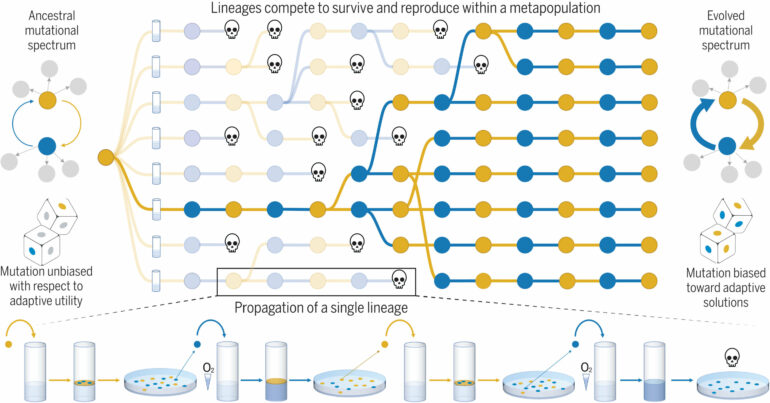A new study by researchers at the Max Planck Institute for Evolutionary Biology (MPI-EB) sheds fresh light on one of the most debated concepts in biology: evolvability. The work provides the first experimental evidence showing how natural selection can shape genetic systems to enhance future capacity for evolution, challenging traditional perspectives on evolutionary processes.
The research is published in the journal Science. A related Perspective article also appears in Science.
The ability of organisms to generate adaptive genetic variation is crucial for evolutionary success, particularly in changing environments. The MPI-EB study investigates whether natural selection operates not merely as a “blind” process driven by random mutations but could actively favor mechanisms that channel mutations toward adaptive outcomes.
The researchers conducted a three-year experiment with experimental microbial populations. These populations were subjected to an intense selection regime requiring repeated transitions between two phenotypic states under fluctuating environmental conditions. Lineages unable to develop the required phenotype were eliminated and replaced by successful ones, creating conditions for selection to hone traits that are adaptive at the level of lineages.
Evolution of a hyper-mutable locus delivers foresight
Through the analysis of more than 500 mutations, the study uncovered the emergence of a localized hyper-mutable genetic mechanism in certain microbial lineages. This hyper-mutable locus, which arose through a multi-step evolutionary process, exhibited a mutation rate up to 10,000 times higher than that of the original lineage. It enabled rapid and reversible transitions between phenotypic states through a genetic mechanism similar to contingency loci in pathogenic bacteria.
“Experiments often lay the path to new understanding, dispelling mystery through elucidation of mechanistic detail,” said researcher Paul Rainey. “Our findings show that selection at the level of lineages can drive the evolution of traits that enhance evolutionary potential, offering a fascinating glimpse into how evolution can gain what appears to be ‘foresight.'”
Researcher Michael Barnett added, “By demonstrating the evolution of a hyper-mutable locus, we show that adaptation is not just about surviving in the present but also about refining the ability to adapt in the future.”
The results challenge the long-held view that evolution operates without foresight. Instead, they reveal how natural selection can embed evolutionary history into genetic architecture, enabling organisms to “anticipate” environmental changes and accelerate their adaptation. This research not only provides critical insights into the evolution of microbial pathogens but also has implications for understanding the mechanisms of adaptation in complex systems.
More information:
Michael Barnett et al, Experimental evolution of evolvability, Science (2025). DOI: 10.1126/science.adr2756
Perspective: Edo Kussell, Enabling evolvability to evolve, Science (2025). DOI: 10.1126/science.adv4087
Provided by
Max Planck Society
Citation:
Insights into evolutionary dynamics: Study reveals the evolution of evolvability (2025, February 20)



